Posted September 6, 2021 by Nicky in Reviews / 0 Comments
 Burning the Books: A History of Knowledge Under Attack, Richard Ovenden
Burning the Books: A History of Knowledge Under Attack, Richard Ovenden
Burning the Books was really readable, and a bit broader than maybe I expected — it isn’t just about book burnings, but also about the importance of archives, of the kind of information people don’t necessarily expect to be useful. It mentions all kinds of historical events, more and less well-known, which help to give a broader scope of how libraries and archives have impacted people (for good and ill, but often in the end for good — Ovenden mentions the key roles of archives in the reconciliation process for torn nations, like the availability of the Stasi’s archives in East Germany).
It went a bit broader than the similar book I read recently about libraries, but it is mostly focused on books/knowledge as collected and curated by libraries and archives. It’s not super interested in other forms of knowledge, and it doesn’t really touch on modern issues of book bannings (frequent in the US, for instance, enough to spawn Banned Books Week).
Overall, quite enjoyable (insofar as learning about attacks on knowledge is enjoyable; interesting may be the better word), and as far as I can tell, it’s well-researched.
Rating: 4/5
Tags: book reviews, books, history, non-fiction, Richard Ovenden
Posted August 23, 2021 by Nicky in Reviews / 0 Comments
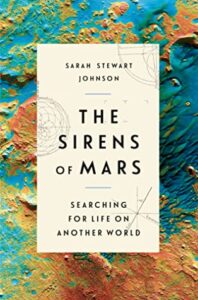 The Sirens of Mars, Sarah Stewart Johnson
The Sirens of Mars, Sarah Stewart Johnson
The Sirens of Mars is partly the history of science about Mars, and partly about the author’s relationship with Mars. That’s a bit of a trend in popular science, and to be honest, I’m starting to really dislike it — at least when it veers from the writer’s career and things they worked on (pretty relevant) to things which are not really relevant (giving birth to a child). It’s not supposed to be your autobiography; it’s billed as a book about Mars.
Despite finding that aspect frustrating, I mostly enjoyed this. It is a touch biographical about scientists like Sagan as well, but at least that told me things I didn’t already know (e.g. I hadn’t known about Sagan’s struggle with achalasia). There were some details of the Mars missions and the people around them which were new to me as well — I didn’t remember anything about Phoenix at all, totally overshadowed by Curiosity in my memory, I suppose!
What we know about Mars has been filled with missteps where we dreamed more than we could actually detect, like the canals and Sagan’s dream of fast-moving creatures that we wouldn’t capture with a camera. This book is an interesting, if slightly meandering, recounting of that journey and where it has brought us. It might be unsatisfying to some that there’s still a lot of science left to do on Mars, and we don’t have solid answers to some of the questions Johnson discusses. I love the idea that we always have more to learn, though.
Rating: 3/5
Tags: book reviews, books, non-fiction, Sarah Stewart Johnson, science
Posted August 21, 2021 by Nicky in Reviews / 0 Comments
 The Invention of Murder, Judith Flanders
The Invention of Murder, Judith Flanders
This could easily have felt really prurient and invasive, given its focus on the various bloody murders that fascinated Victorian society — or too bloodless and dry despite the topic, if it got too academic. I found that Flanders steered a perfect path; it might still be too dry for those who are mostly interested in the murder part of it, but I found it really fascinating, especially as someone who studied the development of crime fiction in novel-form (mostly in the following century).
Flanders does hop about in time a little bit, which gets frustrating and a little confusing. It’s partly because the chapters are grouped thematically, which mostly does work, though since it marks a progression over time then maybe it could have been managed a little better. There are lots of examples to illustrate the trends being discussed, plus images where appropriate as well.
There’s lots of referencing at the end, which is always reassuring in a non-fic work like this. All in all, I’d be happy to read more by Flanders.
Rating: 4/5
Tags: book reviews, books, history, Judith Flanders, non-fiction
Posted August 17, 2021 by Nicky in Reviews / 0 Comments
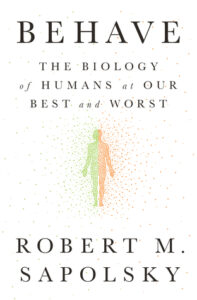 Behave: The Biology of Humans at Our Best and Worst, Robert Sapolsky
Behave: The Biology of Humans at Our Best and Worst, Robert Sapolsky
There isn’t much new in Behave if you’ve read a few different books about human behaviour, though he does have a very clear way of explaining some basic biological concepts that I initially found really engaging (despite my own familiarity with them). In general, he uses and discusses the same studies and anecdata that everyone uses to explain various aspects of human behaviour, and mostly this book pulls it all together to make some general statements about human behaviour and what causes it. The main takeaway, of course, is “it’s complicated” — but he does a good job of picking things apart, relating them to each other, and putting forward his views.
Personally, I find this kind of book (and this book specifically) challenging because I would love to believe I have free will, and not just in choosing what colour my socks are. Sometimes I get a really good example of how I don’t (PTSD and other anxiety disorders can really demonstrate that), and I don’t like it… and this book is just such an experience. As a scientist, there’s just no room left for what Sapolsky calls the ‘homunculus’ that can pilot you, unaffected by hormones and past experiences and the size of your hippocampus.
And… in the end, for me, it felt like Sapolsky was reiterating a lot of stuff I already knew, at very great length. So if it’s something you haven’t read about or looked into before, I think it’d be a good place to start. The basics are really well laid out! But if you’ve been there and read that, then maybe give it a miss.
Rating: 3/5
Tags: book reviews, books, non-fiction, Robert Sapolsky, science
Posted August 14, 2021 by Nicky in Reviews / 2 Comments
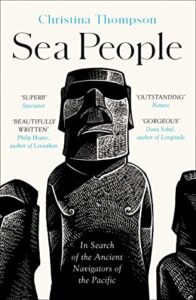 Sea People: In Search of the Ancient Navigators of the Pacific, Christina Thompson
Sea People: In Search of the Ancient Navigators of the Pacific, Christina Thompson
Christina Thompson’s husband, Seven, is Maori — but Thompson herself is not. This book is mostly about the history of the Polynesian peoples from a Western-eye view: the “discovery” of the islands, and our questions and experiments and concerns about the Polynesian past and where everyone came from. I’d been hoping for something a little closer to the subject matter, even if not written by a person from Polynesia, but it’s very much from an outsider’s point of view, focusing on what outsiders have learned through anthropological studies, archaeology and later carbon dating, etc.
It’s very readable and pretty enjoyable for what it is, but I felt it was sorely lacking in Polynesian voices. Tupaia, a priest and navigator who chose to sail with Cook, is mentioned, along with some later scholars who were from the area or naturalised there, but… it really feels like “how the West found these islands, and what they made of it once they got there”. I was hoping for something a little more centred on the other point of view.
I was also hoping for a bit more discussion of the archaeology of the islands, but Thompson focuses more on the stories and navigational skills passed down. Still, there are some glimpses of the archaeology and in general it’s a fair introduction to the area and what we’ve figured out about the deeper history of the place. It shouldn’t be surprising for people to learn that the genealogies and stories did contain much useful information that matches what Western methods have found; we respect that when it comes to Norse sagas!
Anyway, enjoyable, if not what I’d hoped for.
Rating: 3/5
Tags: book reviews, books, Christina Thompson, history, non-fiction
Posted August 9, 2021 by Nicky in Reviews / 0 Comments
 Index, a History of The, Dennis Duncan
Index, a History of The, Dennis Duncan
Received to review via Netgalley; publication date 2nd September 2021
Indexes don’t exactly sound like the most scintillating of subjects, I guess. On the face of it, they’re such a utilitarian thing, and most of us don’t give them a second thought. But I really enjoy histories that dig into things we take for granted like this, and it’s usually surprisingly rewarding, so I thought this sounded like a good time — and I wasn’t wrong. It’s not just about the minutiae of how to create a good index (although that’s certainly part of it), but also about people’s attitudes to indexes, and what that says about people’s needs, wants and fears when it comes to literacy and scholarship.
The highlight of the book is probably Duncan’s delighted tour of how to use an index to be truly petty. Would you imagine that an index could cost a politician an election? Well, there’s at least one case where an index was a factor. Can you picture getting one over on your rival with a catty little index entry? There’s some really fascinating stuff lurking behind some indexes, and it’s fascinating.
I also thought the examples of using indexes as a format for telling fiction were interesting; as Duncan says, they don’t quite work because they can’t quite imitate the random, non-chronological format… but there are some really imaginative stories out there which give it a go.
Overall, this was everything I’d hoped for.
Rating: 4/5
Tags: book reviews, books, Dennis Duncan, history, non-fiction
Posted August 8, 2021 by Nicky in Reviews / 2 Comments
 Braiding Sweetgrass: Indigenous Wisdom, Scientific Knowledge, and the Teachings of Plants, Robin Wall Kimmerer
Braiding Sweetgrass: Indigenous Wisdom, Scientific Knowledge, and the Teachings of Plants, Robin Wall Kimmerer
From the reviews and blurbs I read for this, I was expecting something that used scientific knowledge a little more than this. It is there, woven into how the author understands the world… but much of it is autobiography, a memoir of how the author came to understand the world through an amalgam of scientific knowledge and training (she is a botanist) and the teachings of indigenous people. She is Potawatomi herself, though those are not the only traditions she references.
I’m afraid that far from being a spirit-nourishing breath of fresh air, as others have found it, it ultimately struck me as very sentimental. She romanticises indigenous lives and teachings to a huge degree. It’s difficult, because of course much of what she says about the changes colonisation brought to the US is true, and I agree with her about the need to live more constructively with other beings on Earth — I don’t think there’s much I actually disagreed with at all! (I can think of one point: she wants to see ecosystems restored to exactly what they were, while I’m not sure that is always possible or desirable. The clock can’t simply be turned back.)
…And yet, still, I found the whole book very sentimental and a little, I guess, vicariously embarrassing? I’m sure the author would view that to some extent as my poverty of spirit, but on the one hand, I don’t find science so devoid of wonder and warmth as she says, and on the other, I don’t think I need to imbue inanimate objects with innate purpose and souls in order to treat the world with respect.
Admittedly, it also does not help that I don’t share her experiences. Britain has different flora and fauna, obviously, and it’s that which would be more likely to spark off that sentimentality in me; talk about wild blackberries on the side of Caerphilly mountain and I can summon up the right warmth, but I have no idea what sweetgrass even looks like beyond the very vaguest outline.
In the end, just… didn’t enjoy it. Had hoped for more science and less sentiment.
Rating: 2/5
Tags: book reviews, books, non-fiction, Robin Wall Kimmerer, science
Posted August 7, 2021 by Nicky in Reviews / 0 Comments
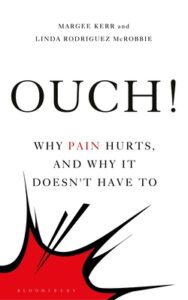 Ouch!: The New Science of Pain, Linda Rodriguez McRobbie, Margee Kerr
Ouch!: The New Science of Pain, Linda Rodriguez McRobbie, Margee Kerr
I’d somewhat feared when I picked this book up that it would be unsympathetic to those with chronic pain, in the way that some doctors are at the moment, because the overprescription of opiates is so much on their minds that everyone reporting pain sounds like a drug seeker to them. There is a bit of commentary on the fact that modern people are more likely to report pain and to be afraid of pain, etc, etc, but overall I found that the two authors were fairly sympathetic and willing to seek out multiple views.
One of the authors has experience with chronic pain and a degenerative illness, and both of them make sure to position themselves so the reader understands where they’re coming from — perhaps too autobiographical for some when it comes to popular science, but I think it was valuable in this case. Either way, both seem to have done a lot of research, including hands-on. Their attitude does lean toward “pain is a good thing and painkillers are generally the wrong treatment”, but doesn’t exclude the usefulness of painkillers for some people. It’s mostly sensitive and sympathetic, as I said, including toward the BDSM community, whose attitudes toward pain they also discuss.
It’s a layperson-friendly guide to what we understand about pain, not just biologically (although it does discuss that) but also psychologically and socially… and it discusses not just physical pain, but to some degree emotional pain as well (particularly as you can’t really have one without the other: human experience isn’t neatly divided like that). It was what I’d hoped for from another book which was much more about responses to pain, so that was nice. Overall, it’s super readable, and I flew through it.
Rating: 4/5
Tags: book reviews, books, non-fiction, science
Posted August 6, 2021 by Nicky in Reviews / 0 Comments
 Elephants on Acid, Alex Boese
Elephants on Acid, Alex Boese
I was warned by reviews that Boese covers some abhorrent experiments on animals without any kind of critique, and that’s correct. Boese seems more interested in the shock and amusement factor of some of these experiments, including expecting people to be rather shocked that scientists have tried to study sex in the lab. I actually knew about most of these experiments and findings before, so there was nothing much shocking or surprising for me — except his casual tone about animal experimentation.
(I’m not personally against animal experimentation when necessary, when there’s a possibility of great benefit. I think. It’s a stance that wavers across time, something that I have great difficulty with. What I never change my mind on is unnecessary experimentation: harming animals just to see what happens. Like giving them a massive and deadly overdose of acid, for example.)
It’s a good overview of some “weird” experiments, some of which have produced useful results. Otherwise, meh?
Rating: 2/5
Tags: Alex Boese, book reviews, books, non-fiction, science
Posted August 4, 2021 by Nicky in Reviews / 0 Comments
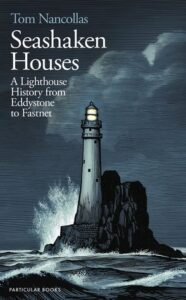 Seashaken Houses, Tom Nancollas
Seashaken Houses, Tom Nancollas
This was a complete impulse-buy on my part; something about it just really drew me, in the moment, so I went ahead and grabbed it. I read it right away to try to capitalise on that, and it was the perfect thing for my mood: it’s a history of a number of specific lighthouses and how they relate to the development of rock lighthouses in the UK, but also a personal response to them in many ways –Nancollas’ enthusiasm and interest, along with his imaginings about the lighthouses, really shine through. Do I really care about how the light of a particular lighthouse was installed? Only because he did, and made it sound interesting.
There were a couple of bits I found a bit overly sentimental or kinda purple-prose-y, and I had a roll of my eyes when he referenced King Arthur and got something wrong (Arthur died at Camlann, not anywhere else, in most versions of the Arthurian stories)… but mostly it just really hit the spot. I love it when someone can take a topic that I have very little personal connection to, and make it fascinating. If that sounds interesting to you too, then I recommend this!
Rating: 4/5
Tags: book reviews, books, history, non-fiction, Tom Nancollas
 Burning the Books: A History of Knowledge Under Attack, Richard Ovenden
Burning the Books: A History of Knowledge Under Attack, Richard Ovenden








